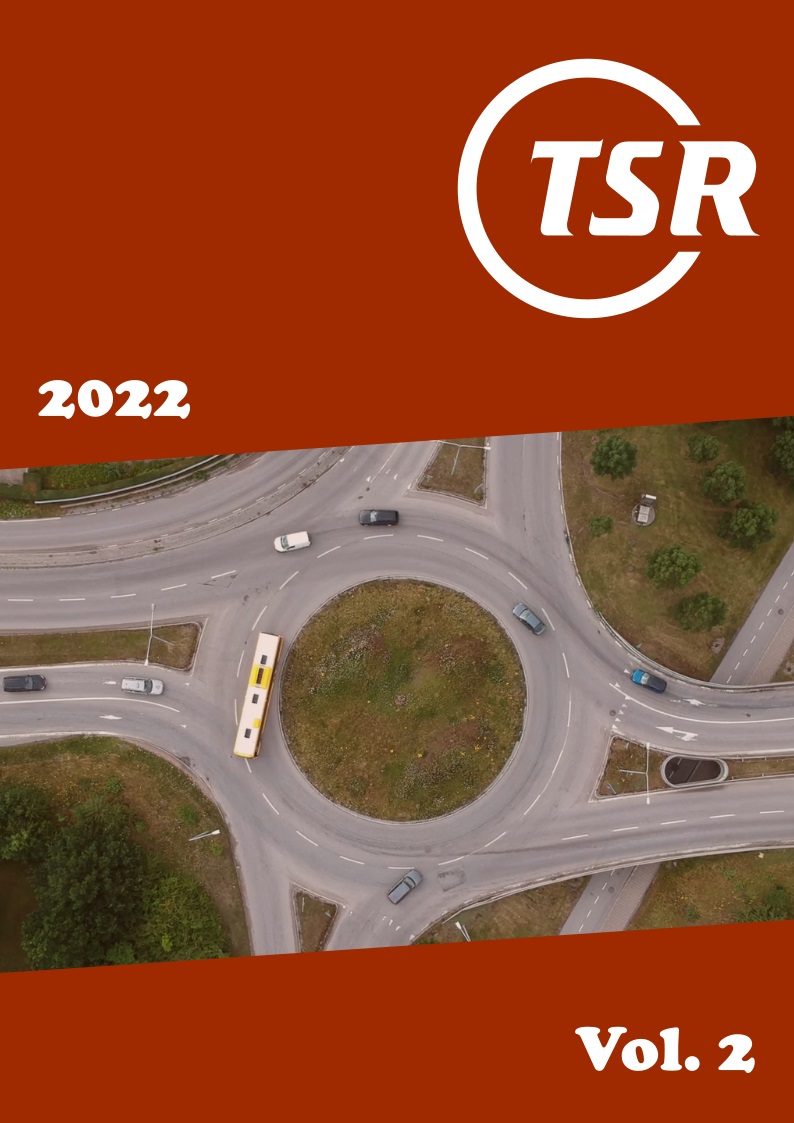Rollator related pedestrian single accidents and collision events in Sweden
DOI:
https://doi.org/10.55329/cysb9519Keywords:
acute injuries, elderly, rollators, traffic environment, vulnerable road users (VRUs), four-wheeled walkersAbstract
Rollators (four-wheel walkers in USA; zimmer frames in UK) are commonly used as mobility aids for the elderly and people with a variety of disabilities. Pedestrian rollator users are a sub-group of Vulnerable Road Users (VRUs), although this group is rarely recognised in traffic safety contexts. The aim of this study is to extract and analyse rollator related pedestrian accident and injury data in Sweden. The results will provide valuable insight into the risks and obstacles rollator users are exposed to in the traffic environment and may in the long term contribute to improving the mobility of this group. The current study is based on data from 2,020 accidents involving 2,305 persons extracted from the Swedish Traffic Accident Data Acquisition (STRADA) database. For consistency reasons, a subset of data (N = 745) was analysed in order to investigate the development of accidents over a period of 10 years. Thereafter, each accident in the whole data set was registered as either single or collision. The results show that the number of rollator accidents in Sweden increased by approximately 80% during 2007–2016. Females dominate the injury statistics of single accidents, collisions, as well as fatal outcome, which may be due to exposure and/or differences in physical characteristics. Single accidents are much more common than collisions (n=1,668 and n=352, respectively) and the injury consequences are at least as serious. Data from the present study have revealed that the frequency of minor injuries (ISS 1–3) is 4.3 times, moderate (ISS 4–8) 6.0 times and serious injuries (ISS 9–15) 8.9 times higher in single accidents than in collisions. Fatal injuries are, however, more common in collision events (33 in comparison to 8). The vast majority of single accidents (99%) was due to falls. Many of the single accidents (29%) were caused by ground level differences (typically a curb) or due to surface conditions (19%). Collisions involved cars, trucks or buses in 91% of cases, occurring predominantly in car parks (31%) and on (zebra) crossings (30%). In 54% of cases the vehicles reversed into the rollator. Abbreviated Injury Scale (AIS) 3+ injuries were dominated by head (36%) and torso (33%) injuries in collision events, and hip fractures (71%) in single accidents. The present study shows that further research into rollator user related accidents, both single accidents and collision events, is required. In order to introduce appropriate measures, future work should follow up on accident and injury developments and further improve the quality of mobility aid related accident data in general. Improved stability and design, proper training programmes, effective maintenance services, development of a supporting infrastructure would contribute to increased safety for rollator users.
Downloads
References
Aldman, B., Forsström, Å., & Samuelsson, U. (1976) Commuting accidents in the Stockholm region 1971. Proceedings: IRCOBI Conference 7–8 September 1976; Amsterdam (The Netherlands). http://www.ircobi.org/wordpress/downloads/irc1976/pdf_files/1976_22.pdf (Acc. 20 January 2022)
Aldred, R. (2018) Inequalities in self-report road injury risk in Britain: A new analysis of National Travel Survey data, focusing on pedestrian injuries. Journal of Transport & Health, 9, pp. 96–104. https://doi.org/10.1016/j.jth.2018.03.006
Amin, K., Skyving, M., Bonander, C., & Nilsson, F. Fall- and collision related injuries among pedestrians in road traffic environment – A Swedish national register-based study. Journal of Safety Research, 2022 (accepted for publication).
Bateni, H., & Maki, BE. (2005) Assistive devices for balance and mobility: benefits, demands, and adverse consequences. Archives of Physical Medicine and Rehabilitation, 86(1), pp. 134–145 https://doi.org/10.1016/j.apmr.2004.04.023
Belin, M-Å., Tillgren, P., & Vedung, E. (2012) Vision Zero: a road safety policy innovation. International Journal of Injury Control and Safety Promotion, 19(2), pp. 171–179 https://doi.org/10.1080/17457300.2011.635213
Berg, GM., Carlson, T., Fairchild, J., Edwards, C., & Sorell, R. (2017) Development of a Falls Registry: A Pilot Study. Journal of Trauma Nursing, 24(4), pp. 224–230 https://doi.org/10.1097/JTN.0000000000000295
Berg, HY., Ifver, J., & Hasselberg, M. (2016) Public health consequences of road traffic injuries – Estimation of seriously injured persons based on risk for permanent medical impairment. Transportation Research Part F: Traffic Psychology and Behaviour, 38, pp. 1–6 https://doi.org/10.1016/j.trf.2015.12.007
Berntman, M., Holmberg, B., & Wretstrand, A. (2012) Hur säker är bussen? Skador och risker i samband med bussresor i tätort. Bulletin 274, Department of Technology and Society, Lund University, Sweden.
Berntman, M. (2015) Fotgängares olyckor och skador i trafikmiljö med fokus på fallolyckor. Bulletin 295. Department of Technology and Society, Lund University, Sweden.
Brenac, T., & Fournier, J-F. (2018) Collisions between pedestrians and reversing vehicles in public settings in France. The Open Transportation Journal, 12(1), pp. 33–42 https://doi.org/10.2174/1874447801812010033
Carlsson, A., & Svensson, M. (2015) Fallolyckor Bland Gångtrafikanter. Report TRV 2013/71828. Chalmers Industriteknik, Gothenburg, Sweden. https://publications.lib.chalmers.se/records/fulltext/226311/local_226311.pdf (Acc. 20 January 2022)
Carlsson, A., & Lundälv, J. (2019) Acute injuries resulting from accidents involving powered mobility devices (PMDs) - Development and outcomes of PMD-related accidents in Sweden. Traffic Injury Prevention, 20(5), pp. 484–491 https://doi.org/10.1080/15389588.2019.1606910
Charette, C., Best, KL., Smith, EM., Miller, WC., & Routhier, F. (2018) Walking Aid Use in Canada: Prevalence and Demographic Characteristics Among Community-Dwelling Users. Physical Therapy, 98(7), pp. 571–577 https://doi.org/10.1093/ptj/pzy038
Charness, N., Boot, W., Mitchum, A., Stothart, C., & Lupton, H. (2012) Aging Driver and Pedestrian Safety: Parking Lot Hazards Study. Florida State University, Tallahassee, FL, Final Technical Report No. BDK83 977–1012.
Chippendale, T., & Lee, CD. (2018) Characteristics and fall experiences of older adults with and without fear of falling outdoors. Ageing and Mental Health, 22(6), pp. 849–855 https://doi.org/10.1080/13607863.2017.1309639
Costamagna, E., Thies, SB., Kenney, LPJ., Howard, D., Lindemann, U., Klenk, J., & Baker, R. (2019) Objective measures of rollator user stability and device loading during different walking scenarios. PLoS ONE, 14(1), pp. 1–13 https://doi.org/10.1371/journal.pone.0210960
Cruz, AO., Santana, SMM., Costa CM., Gomes da Costa, LV., & Ferraz, DD. (2019) Prevalence of falls in frail elderly users of ambulatory assistive devices: a comparative study. Disability and Rehabilitation: Assistive Technology, 15(5), pp. 510–514 https://doi.org/10.1080/17483107.2019.1587016
Dunbar, G., Holland, CA., & Maylor, EA. (2004) Older pedestrians: a critical review of the literature. Department for Transport, London, UK, Road Safety Research Rep. 37.
Ekbrand, H., Ekman, R., Thodelius, C., & Möller, M. (2020) Fall-related injuries for three ages groups - Analysis of Swedish registry data 1999-2013. Journal of Safety Research, 73, pp. 143–152 https://doi.org/10.1016/j.jsr.2020.02.016
Elvik, R., Høye, A., Vaa, T., & Sørensen, M. (2009) The handbook of road safety measures. Bingley: Emerald.
Elvik, R., & Bjørnskau, T. (2019) Risk of pedestrian falls in Oslo, Norway: Relation to age, gender and walking surface condition. Journal of Transport and Health,12, pp. 359–370 https://doi.org/10.1016/j.jth.2018.12.006
Elvik, R., & Goel, R. (2019) Safety-in-numbers: An updated meta-analysis of estimates. Accident Analysis and Prevention, 129, pp. 136-147 https://doi.org/10.1016/j.aap.2019.05.019
EuroNCAP (2020) AEB Pedestrian www.euroncap.com/en/vehicle-safety/the-ratings-explained/vulnerable-road-user-vru-protection/aeb-pedestrian (Acc. 22 June 2020)
European Commission. (2017) – Fact Sheet. 2016 Road Safety Statistics: What is Behind the Figures? La Valette. https://ec.europa.eu/commission/presscorner/detail/en/MEMO_17_675 (Acc. 22 June 2020)
European Commission. (2018) The 2018 Ageing Report. Economic & Budgetary Projections for the 28 EU Member States (2016-2070). Institutional Paper 079, May 2018. Luxembourg: Publications Office of the European Union https://ec.europa.eu/info/publications/economic-and-financial-affairs-publications_en (Acc. 22 June 2020)
Gelbard, R., Inaba, K., Okobye, OT., Morrell, M., Saadi, Z., Lam, L., Talving, P., & Demetriades, D. (2014) Falls in the elderly: a modern look at an old problem. The American Journal of Surgery, 208(2), pp. 249–253 https://doi.org/10.1016/j.amjsurg.2013.12.034
Gell, NM., Wallace, RB., LaCroix, AZ., Mroz, TM., & Patel, KV. (2015) Mobility Device Use in Older Adults and Incidence of Falls and Worry About Falling: Findings from the 2011–2012 National Health and Aging Trends Study. Journal of the American Geriatrics Society, 63(5), pp. 853–859 http://doi.org/10.1111/jgs.13393
Gill, TM., Gahbauer, EA., Lin, H., Han, L., & Allore, HG. (2013) Comparisons between older men and women in the trajectory and burden of disability over the course of nearly 14 years. Journal of the American Medical Directors Association, 14(4), pp. 280–286 http://doi.org/10.1016/j.jamda.2012.11.011
Gorrie, CA., Brown, J., & Waite, PME. (2008) Crash characteristics of older pedestrian fatalities: Dementia pathology may be related to ‘at risk’ traffic situations. Accident Analysis and Prevention, 40(3), pp. 912–919 https://doi.org/10.1016/j.aap.2007.10.006
The Government of Sweden (1997) Bill 1996/97:137: Vision Zero and the Traffic Safety Society. Stockholm.
The Government of Sweden (2020) Excerpt from the minutes of the government meeting, 13 February; I2020/00423/US, I2019/00433/US.
International Transport Forum (2008) Towards Zero: Ambitious Road Safety Targets and the Safe System Approach, OECD Publishing, Paris https://doi.org/10.1787/9789282101964-en
Intelligent Transport Systems (ITS) Directive. (2010) For the deployment of Intelligent Transport Systems in the field of road transport and for interfaces with other modes of transport. Directive 2010/40/EU of the European Parliament and of the Council of 7 July 2010, Official Journal of the European Union. Article 4 Definitions No. 7. http://eur-lex.europa.eu/legal-content/EN/TXT/PDF/? uri1⁄4CELEX:32010L0040&from1⁄4EN (Acc. 20 January 2022)
Jiraporn, S-O., Tirrell, GP., Kamsom, A., Marill, KA., Shankar, KN., & Liu, SW. (2018) A High-yield Fall Risk and Adverse Events Screening Questions From the Stopping Elderly Accidents, Death, and Injuries (STEADI) Guideline for Older Emergency Department Fall Patients. Academic Emergency Medicine: Official Journal of the Society for Academic Emergency Medicine, 25(8), pp. 927–938 https://doi.org/10.1111/acem.13413
Johansson, R. (2009) Vision Zero – Implementing a policy for traffic safety. Safety Science, 47(6), pp. 826–831 https://doi.org/10.1016/j.ssci.2008.10.023
Kelsey, JL., Procter-Gray,. E, Hannan, M T., & Li, W. (2012) Heterogeneity of Falls Among Older Adults: Implications for Public Health Prevention. American Journal of Public Health, 102(11), pp. 2149–2156 https://doi.org/10.2105/AJPH.2012.300677
Li, W., Keegan, TH., Sternfeld, B., Sidney, S., Quesenberry, CP., & Jr Kelsey, JL. (2006) Outdoor falls among middle-aged and older adults: A neglected public health problem. American Journal of Public Health, 96(7), pp. 1192–1200 https://doi.org/10.2105/AJPH.2005.083055
Li, W., Procter-Gray, E., Lipsitz, LA., Leveille, SG., Hackman, H., Biondolillo, M., & Hannan, MT. (2014) Utilitarian walking, neighborhood environment, and risk of outdoor falls among older adults. Amerian Journal of Public Health, 104(9), pp. e30–37 https://doi.org/10.2105/AJPH.2014.302104
Liu, HH. (2009) Assessment of rolling walkers used by older adults in senior-living communities. Geriatrics & Gerontology International, 9(2), pp. 124–130 https://doi.org/10.1111/j.1447-0594.2008.00497.x
MacKenzie, EJ. (1984) Injury severity scales: overview and directions for future research. American Journal of Emergency Medicine, 2(6), pp. 537–549 https://doi.org/10.1016/0735-6757(84)90081-0
Malin, F., Silla, A., & Mladenović, M. (2020) Prevalence and factors associated with pedestrian fatalities and serious injuries: case Finland. European Transport Research Review, 12(29), pp. 1–17 https://doi.org/10.1186/s12544-020-00411-z
Malm, S., Krafft, M., Kullgren, A., Ydenius, A., & Tingvall, C. (2008) Risk of permanent medical impairment (RPMI) in road traffic accidents. Annals of Advances in Automotive Medicine, 52, pp. 93–100.
Methorst, R., Schepers, P., Christie, N., Dijst, M., Risser, R., Sauter, D., & van Wee, B. (2017) ‘Pedestrian falls’ as necessary addition to the current definition of traffic crashes for improved public health policies. Journal of Transport & Health 6, pp. 10–12 https://doi.org/10.1016/j.jth.2017.02.005
Nilsson, G. (1986) Halkolyckor – Förekomst och konsekvenser. Report 291, Swedish National Road and Transport Research Institute (VTI), Linköping, Sweden
https://www.diva-portal.org/smash/get/diva2:674654/FULLTEXT01.pdf (Acc. 20 January 2022)
Oxley, JA., Fildes, BN., Ihsen, E., Charlton, JL., & Day, RH. (1997) Differences in traffic judgements between young and old adult pedestrians. Accident Analysis and Prevention, 29(6), pp. 839–847 https://doi.org/10.1016/s0001-4575(97)00053-5
Oxley, J., & Fildes, B. (1999) Safety of older pedestrians: strategy for future research and action initiatives. Monash University Accident Research Centre, Clayton, Victoria, Australia, Rep. 157 https://www.monash.edu/__data/assets/pdf_file/0007/216880/muarc157.pdf (Acc. 20 January 2022)
Oxley, JA., Corben, BF., Fildes, BN., & Charlton, JL. (2004) Older pedestrians - meeting their safety and mobility needs. In J. Doak (Ed.), Proceedings of the 2004 Road Safety Research, Policing and Education Conference, 1, pp. 1–11. WA Office of Road Safety https://acrs.org.au/files/arsrpe/RS040052.pdf (Acc. 20 January 2022)
Peterson, LJ., Meng, H., Dobbs, D., & Hyer, K. (2017) Gender Differences in Mobility Device Use Among U.S. Older Adults. The Journals of Gerontology. Series B, Psychological sciences and social sciences, 72(5), pp. 827–835 https://doi.org/10.1093/geronb/gbw081
Resnik, L., Allen, S., Isenstadt, D., Wasserman, M., & Iezzoni, L. (2009) Perspectives on Use of Mobility Aids in a Diverse Population of Seniors: Implications for Intervention. Disability and Health Journal, 2(2), pp. 77–85 https://doi.org/10.1016/j.dhjo.2008.12.002
Rikshöft. (2020) Årsrapport 2020. RIKSHÖFT, Ortopediska kliniken, Skånes Universitetssjukhus Lund, Sweden.
Rosen, T., Mack, KA., & Noonan, RK. (2013) Slipping and tripping: fall injuries in adults associated with rugs and carpets. Journal of Injury and Violence Research, 5(1), pp. 61–69 https://doi.org/10.5249/jivr.v5i1.177
Rosenberg, DE., Huang, S., Simonovich, SD., & Belza, B. (2013) Outdoor Built Environment Barriers and Facilitators to Activity Among Midlife and Older Adults with Mobility Disabilities. Gerontologist, 53(2), pp. 268–279 https://doi.org/10.1093/geront/gns119
Råssjö, P. (2016) Rollatorn ger många äldre ett rörligare liv. Nerikes Allehanda. 24 September.
Schepers, P., den Brinker, B., Methorst, R., & Helbich, M. (2017) Pedestrian falls: A review of the literature and future research directions. Journal of Safety Research, 62, pp. 227–234 https://doi.org/10.1016/j.jsr.2017.06.020
Sheppard, D., & Pattinson, MI. (1986) Interviews with elderly pedestrians involved in road accidents. Transport and Road Research Laboratory, Crowthorne, UK, TRRL Research Rep. 98.
Sherrington, C., & Tiedemann, A. (2015) Physiotherapy in the prevention of falls in older people. Journal of Physiotherapy, 61(2), pp. 54–60 https://doi.org/10.1016/j.jphys.2015.02.011
Skymne, C., Dahlin-Ivanoff, S., Claesson, L., & Eklund, K. (2012) Getting used to assistive devices: Ambivalent experiences by frail elderly persons. Scandinavian Journal of Occupational Therapy, 19(2), pp. 194–203 https://doi.org/10.3109/11038128.2011.569757
Stevens, JA., Thomas, K., the L., & Greenspan, AI. (2009) Unintentional fall injuries associated with walkers and canes in older adults treated in U.S. emergency departments. Journal of the American Geriatrics Society, Aug;57(8), pp. 1464–1469 https://doi.org/10.1111/j.1532-5415.2009.02365.x
Stevenson, M., Segui-Gomez, M., Lescohier, I., Di Scala, C., & McDonald-Smith, G. (2001) An overview of the Injury Severity Score and the New Injury Severity Score. Injury Prevention, 7(1), pp. 10–13 https://doi.org/10.1136/ip.7.1.10
Stutts, JC., Hunter, WW., & Pein, WE. (1996) Pedestrian Crash Types: 1990s Update. Transportation Research Record: Journal of the Transportation Research Board, 1538, pp. 68–74 https://doi.org/10.1177/0361198196153800109
SWOV (2018) Sustainable Safety 3rd edition – The advanced vision for 2018–2030. Principles for design and organization of a casualty-free road traffic system. Report. The Hague: SWOV Institute for Road Safety Research. https://www.swov.nl/en/publication/sustainable-safety-3rd-edition-advanced-vision-2018-2030 (Acc. 20 January 2022)
The Swedish Handicap Institute. (2014) Äldrestatistik 2013/2014 – Sammanställning. The Swedish Handicap Institute. www.anhoriga.se/Global/Nyheter/Nyhetsdokument%202014/14309-pdf-aldrestatistik-2013-2014.pdf (Acc. 20 January 2022)
The Swedish Transport Administration. (2017) Gemensam inriktning för säker gångtrafik 1.0. Report No. 2017:102. Borlänge, Sweden. https://trafikverket.ineko.se/Files/sv-SE/26961/Ineko.Product.RelatedFiles/2017_102_gemensam_inriktning_for_saker_gangtrafik.pdf (Acc. 20 January 2022)
The Swedish Transport Administration. (2018) Gemensam inriktning för säker trafik med cykel och moped 2018. Report No. 2018:159. Borlänge, Swedenhttps://trafikverket.ineko.se/ Files/en-US/48193/Ineko.Product.RelatedFiles/2018_159_gemensam_ inriktning_for_saker_trafik_med_cyker_och_moped_2018.pdf (Acc. 20 January 2022)
The Swedish Transport Administration. (2020) Analys av trafiksäkerhetsutvecklingen 2019 – Målstyrning av trafiksäkerhetsarbetet mot etappmålen 2020. Report No. 2020:120. Borlänge, Sweden. https://trafikverket.ineko.se/Files/sv-SE/75691/Ineko.Product.RelatedFiles/2020_120_analys_av_trafiksakerhetsutvecklingen_2019_malstyrning.pdf (Acc. 20 January 2022)
Tournier, I., Dommes, A., & Cavallo, V. (2016) Review of safety and mobility issues among older pedestrians. Accident Analysis and Prevention, 91, pp. 24–35 https://doi.org/10.1016/j.aap.2016.02.031
Transport Analysis. (2015) Cyklandets utveckling i Sverige 1995–2014 – en analys av de nationella resvaneundersökningarna. Report 2015:14, Trafikanalys, Stockholm, Sweden. https://www.trafa.se/globalassets/rapporter/2010-2015/2015/rapport-2015_14-cyklandets-utveckling-i-sverige-1995-2014.pdf (Acc. 20 January 2022)
West, BA., Bhat, G., Stevens, J., & Bergen, G. (2015) Assistive device use and mobility-related factors among adults aged ≥ 65years. Journal of Safety Research, 55, pp. 147–150 https://doi.org/10.1016/j.jsr.2015.08.010
World Bank. (2017) The High Toll of Traffic Injuries: Unacceptable and Preventable – The Macro-Economic and Welfare Benefits of Reducing Road Traffic Injuries in Low- & Middle-Income Countries. https://openknowledge.worldbank.org/handle/10986/29129 (Acc. 20 January 2022)
WHO (2009) Global status report on road safety: time for action. Geneva, World Health Organization https://www.afro.who.int/publications/global-status-report-road-safety-time-action (Acc. 20 January 2022)
WHO (2018) Global status report on road safety 2018. Geneva: World Health Organization. Licence: CC BYNC-SA 3.0 IGO https://www.who.int/publications/i/item/9789241565684 (Acc. 20 January 2022)
Öberg, G., Nilsson, G., Velin, H., Wretling, P., Berntman, M., Brundell-Freij, K., Hydén, C., & Ståhl, A. (1996) Fotgängares och cyklisters singelolyckor. Report 799, Swedish National Road and Transport Research Institute (VTI), Linköping, Sweden http://vti.diva-portal.org/smash/get/diva2:672671/FULLTEXT01.pdf (Acc. 20 January 2022)
Öberg, G. (2011) Skadade fotgängare. Fokus på drift och underhåll vid analys av sjukvårdsregistrerade skadade i STRADA, Report 705, Swedish National Road and Transport Research Institute (VTI), Linköping, Sweden https://www.diva-portal.org/smash/get/diva2:670581/FULLTEXT01.pdf (Acc. 20 January 2022)
Downloads
Published
Versions
- 2023-10-14 (2)
- 2022-02-02 (1)
How to Cite
Issue
Section
License
Copyright (c) 2022 Anna Carlsson, Jörgen Lundälv

This work is licensed under a Creative Commons Attribution 4.0 International License.
Funding data
-
Trafikverket
Grant numbers TRV 2016/86272 (Skyltfonden) -
VINNOVA
Grant numbers 2021-01598









